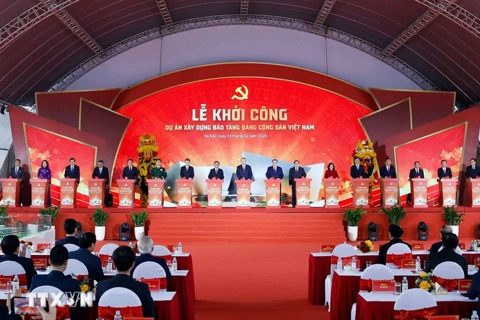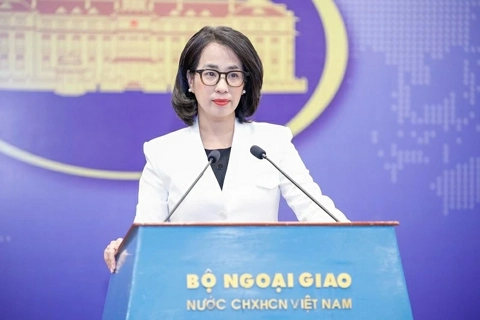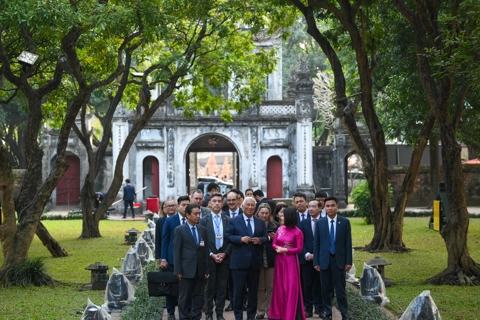China views Vietnam as top priority in its neighbourhood diplomacy strategy: Xi Jinping
General Secretary To Lam proposed that digital transformation and science and technology be elevated as new focal points in bilateral cooperation between the two countries.
THE HANOI TIMES — China is committed to fostering friendly relations with Vietnam, regards it as a key priority in its neighbourhood diplomacy.
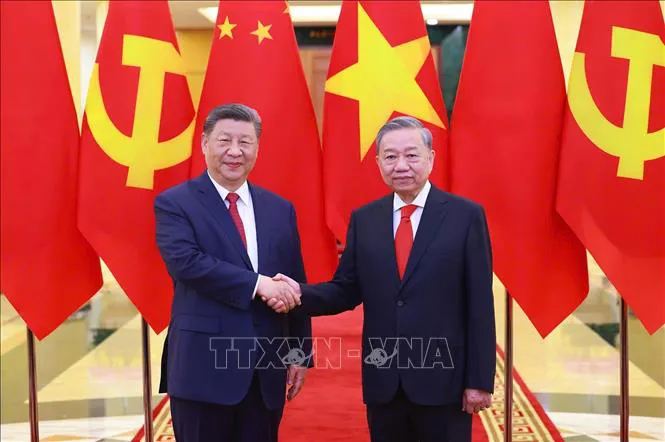
Vietnam's General Secretary To Lam and China's General Secretary and State President Xi Jinping. Photos: VNA
“China firmy supports Vietnam’s prosperity and the well-being of its people,” General Secretary of the Communist Party of China and State President Xi Jinping shared during a meeting with Vietnam’s General Secretary To Lam today [April 14].
During the meeting, General Secretary To Lam expressed confidence that the visit by General Secretary and President of China Xi Jinping would mark a new milestone in the history of friendship between the two countries, further deepening the Comprehensive Strategic Cooperative Partnership and advancing the building of a strategically significant Vietnam–China community with a shared future.
He emphasized that Vietnam always considers the development of relations with China an objective necessity, a strategic choice, and a top priority in its overall foreign policy.
Xi noted that China had recently held a Central Conference on work relating to foreign affairs with neighboring countries. The conference emphasized a vision of building "five major homes": peace, security, prosperity, beauty, and friendship with neighbouring countries, following the principles of peaceful coexistence, mutual stability, shared prosperity, and sincere, inclusive, and mutually beneficial cooperation.
In this spirit, Xi affirmed that China remains steadfast in its policy of friendship toward Vietnam, consistently views Vietnam as a priority in its neighbourhood diplomacy, and strongly supports Vietnam’s prosperity and the well-being of its people.
Regarding future directions for bilateral relations, both sides agreed to maintain regular high-level exchanges and upgrade the Strategic Dialogue mechanisms between their ministries of Foreign Affairs, Defense, and Public Security to ministerial level. They also committed to enhancing practical cooperation across various sectors.
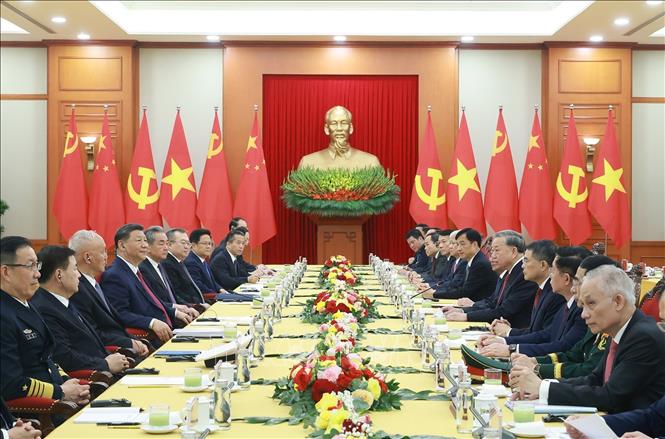
The meeting between the two leaders takes place after a welcome ceremony hosted by General Secretary To Lam.
Vietnam and China will establish an intergovernmental committee on railway cooperation to promote joint railway projects. The two sides will also coordinate activities for the "Vietnam–China People-to-People Exchange Year 2025" to strengthen social foundations, deepen multilateral coordination, and manage and resolve differences effectively.
General Secretary To Lam proposed that the two countries make digital transformation and science and technology new highlights in bilateral cooperation. He called for strengthened collaboration in key technologies, more balanced trade, higher-quality investment, and greater focus on major projects in Vietnam, particularly those addressing urban air pollution in cities like Hanoi.
He also stressed the need to maintain strategic dialogue and enhance cooperation in critical areas such as diplomacy, national defense, and security; promote connectivity of strategic transport infrastructure; and prioritize preferential loans, technology transfer, and human resource training. Both sides should make their best efforts to implement and ensure the progress of the Lao Cai – Hanoi – Haiphong railway project.
He also expressed the hope that both countries would further consolidate their social foundations and step up public education, especially among the younger generation, on the tradition of Vietnam–China friendship.
Xi called for deepening strategic trust, intensifying exchanges on national governance, and advancing the alignment between the Belt and Road Initiative and the "Two Corridors, One Belt" framework.
He welcomed the growing volume of Vietnamese exports to China, encouraged more Chinese enterprises to invest in Vietnam, and proposed strengthening cooperation in production and supply chains. He also called for expanding collaboration in high-tech sectors such as 5G, artificial intelligence, the Internet of Things, semiconductors, green development, and turning scientific innovation into real productivity. He expressed a desire to strengthen cooperation in judicial and law enforcement areas within the Lancang–Mekong framework.
Both sides agreed to seek effective measures to manage differences appropriately and promote cooperation in line with the new stage of Vietnam–China relations, based on international law.
They reaffirmed their commitment to strictly comply with the consensus between ASEAN and China in implementing the Declaration on the Conduct of Parties in the South China Sea (DOC), and to work toward an effective and substantive Code of Conduct (COC) consistent with international law, including the 1982 United Nations Convention on the Law of the Sea (UNCLOS).
Following the talks, General Secretary To Lam and General Secretary and President Xi Jinping viewed and were briefed on 45 cooperation agreements signed between the two countries.
On the same evening, General Secretary To Lam and President Luong Cuong hosted a formal banquet to welcome General Secretary and President of China Xi Jinping on his state visit to Vietnam.







